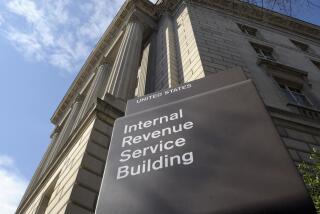Thanks a Lot
- Share via
If you’re one of the 34 million Americans calling the Internal Revenue Service for advice on taxes this year, you stand better than a one-in-three chance of getting wrong or incomplete information. That’s the experience of investigators from Congress’ General Accounting Office, who made 918 calls to the IRS’ toll-free assistance centers in February and March. Those calls yielded wrong answers to sometimes simple questions 22% of the time, and incomplete answers in 15% of the cases. Overall, IRS employees were able to give full and correct answers to only 63% of their callers. That’s down from 83% last year.
When government employees err, taxpayers fork over. IRS Commissioner Lawrence B. Gibbs has told Congress that no penalties would be assessed against tax filers if--we suspect that this is a very large if--auditors “were able to determine that a taxpayer did ask a question and did get an erroneous answer.” But Gibbs added that under the law, which gives the IRS no discretion in the matter, taxpayers who end up owing the Treasury money because of bad advice from the IRS would still have to pay interest charges on the deficiencies. There is a powerful aroma of injustice in that possibility.
Why are IRS information-providers performing so poorly? Largely, it seems, because of inexperience. Gibbs says that fully 30% of his agency’s 3,476 telephone assisters are newly hired this year, the result of a huge turnover in personnel that he attributes to threatened budget cuts. The Reagan Administration wants to slash the budget for IRS taxpayer services next year by a whopping 28%. It’s a good guess that a lot of the experienced workers who handle the IRS’ information phones decided that the time to change jobs is now.
Does the irony in all this need underscoring? Here is an Administration that has trumpeted its success in cutting taxes and, as the President is fond of putting it, getting government off the backs of the people. That supposed burden-lessening achievement is now seen to involve, among other things, cutting way back on what is not only a useful but also an essential public service. In consequence, some millions of Americans this year and probably even more next year, when tax laws become still more complex, will be filing returns based on bad IRS-supplied information, and facing interest charges for innocent mistakes. Ah, but at least Americans are carrying less of the government on their backs. Thanks for the favor.
More to Read
Inside the business of entertainment
The Wide Shot brings you news, analysis and insights on everything from streaming wars to production — and what it all means for the future.
You may occasionally receive promotional content from the Los Angeles Times.










